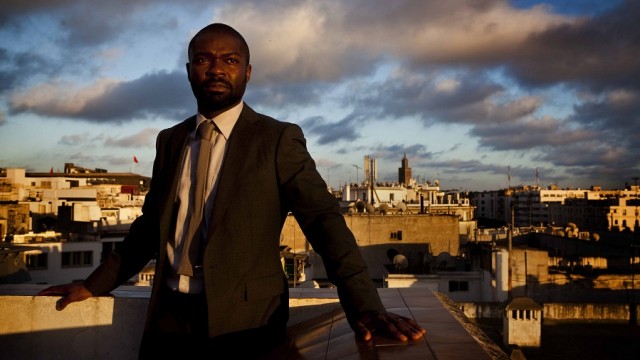Complicit is one of the most uncomfortable films I’ve seen. It sounds like a grandiose, melodramatic statement, but it’s true. Few films have made my stomach hurt as much as this one. Upon a second viewing, even knowing how the plot would unfold, it was still a harrowing experience. Complicit, a Channel 4 production, which deserving won Best Single Drama at the 2014 BAFTA TV Awards, is one of those rare films that wrings tension out of the minutiae of bureaucracy. There are no chases, no flamboyant villains lurking in the shadows, just the raw, painful reality of spy work and the toll it takes on a person’s psyche. It all sounds like a portentous affair, but Complicit is a taut, wonderfully dark experience.
The drama concerns Edward (David Oyelowo), a Black British MI5 agent, who is monitoring Waleed (Arsher Ali), a lead suspect in a potential terror plot. You may ask why I included Edward’s race in the previous sentence. Complicit, in addition to being a character study about a man’s willingness to do the unthinkable for his country, also functions as one of the most quietly scathing critiques of race and discrimination I’ve seen. The operative word is ‘quiet’: save for one scene near the end of the film (more on that in a bit), Edward’s race, particularly in interactions with his superiors, is the elephant in the room. In the beginning of the film, Edward meets with one of his supervisors, Judith (Monica Dolan). Edward presents his case: Waleed, known for his fanatical beliefs, is planning a trip to Yemen; he’ll be staying in a town close to the residence of a known terror suspect. Judith says Edward’s evidence is lacking. Edward remarks it isn’t the first time his doubt has been questioned. Judith probes, Edward carefully choses his words. It’s a so splendidly acted and written, one can feel Edward struggling to keep his frustration and rage in check. And yet, the topic of race is never brought up, not even once.
Complicit is ‘theatrical’ in the best sense of the word. Often with television dramas, be they one-offs, miniseries, or long-running serials, words like ‘theatrical’ and ‘cinematic’ are tossed around to convey that how ‘serious’ and ‘unlike television’ these TV dramas appear. With Complicit, ‘theatrical’ just describes the basic set-up of each scene. Almost every moment in the drama with two or more characters plays like chamber piece. Even then, Guy Hibbert’s brilliant script never dissolves into melodrama. When Edward and Waleed finally meet, the seething hatred the two share for one another is better than any impassioned monologue. While there are moments of shouting, they feel organic, not a desperate bid to drum up cheap drama. Each character delivers dialogue designed to lacerate. When Waleed calls Edward a racial epithet, it delivers an icy gut punch.
Good actors are paramount in such a production, and Oyelowo and Ali are magnificent. Each give Edward and Waleed so many different layers, so many subtexts to play, the audience feels as unsettled and off-kilter as they do in each others’ presence. It’s brilliant work, and the pair of them should have received BAFTA nominations for their incandescent performances.
Watching the film, I was reminded on the interesting ‘push-pull’ relationship between UK and US television. Frequently critics in each nation will look across the pond and say, ‘they are doing stuff we could only dream of!’ Now, I’m a firm believer that each nation excels in different ways when it comes to television drama. However, with regards to the writers of American dramas concerning the Middle East, like Homeland and the execrable Tyrant, I point to Complicit and say, ‘more like this please.’

